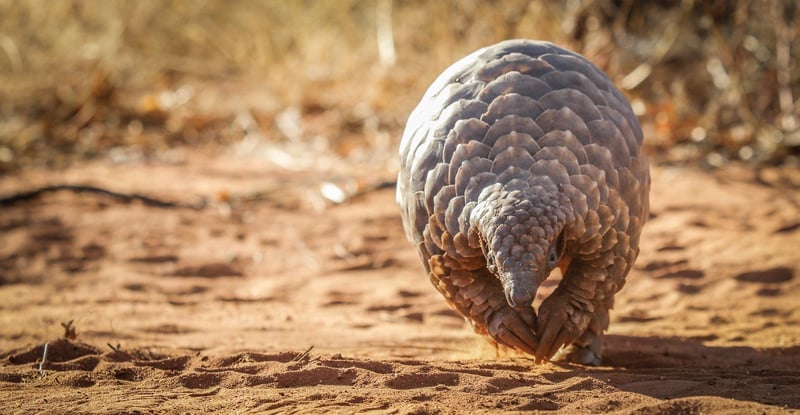
Pangolins are on the brink of extinction, but possibly even more sickening, is the cruelty that is often inflicted on these gentle creatures before they are killed.
Widely considered one of the potential sources of the coronavirus pandemic, the spotlight on pangolins has brought to light some of the unsavory practices and unimaginable cruelty these animals go through in the global wildlife trade. Pangolins are on the brink of extinction, but possibly even more sickening, is the cruelty that is often inflicted on these gentle creatures before they are killed.
What is a pangolin?
Pangolins are the only scaled mammal in the world. Also known as the “scaly anteater”, a pangolin’s body is largely covered in scales made up of keratin—the same material as human fingernails.
These unique creatures have existed for approximately 80 million years and can be found in 51 countries, often living in trees or burrows. There are eight species of pangolin (four Asian and four African), but all species are shy, nocturnal, and solitary animals. These animals are about the size of a golden retriever puppy or a large housecat, with front arms that look similar to a T-Rex.
Pangolins do not have teeth, so they use their long snouts and tongues to feed on up to 70 million insects every year. This makes them very valuable members of the ecosystem because they are natural pest controllers.
Why are pangolins trafficked?
Unfortunately, what makes pangolins unique also makes them subject to unimaginable cruelty. Pangolin meat is considered a delicacy in China and Vietnam and their scales are used in traditional medicines. In 2019 alone, Chinese customs confiscated an enormous 123 tons of pangolin scales. Yet, there is no scientific evidence in modern medicine to show that pangolin scales have any therapeutic or health benefits. Over a million pangolins have been illegally poached from the wild in the past decade to feed the demand of the global wildlife trade for their scales and meat.
How are pangolins trafficked?
In a typical scenario, pangolins hide from hunters in trees and are tugged down or smoked out with fires. As pangolins suffocate and lose consciousness, they run for their freedom but are captured and shoved into bags. Pangolins will coil up as a defense mechanism from natural predators (in fact, “pangolin” means “roller” in Malay), but poachers, armed with machetes, bludgeon them until they are motionless.
While bleeding, pangolins are then thrown into a pot of boiling water and boiled alive.
Pangolins are the world’s most nonhuman trafficked mammal.
Pangolins are poached in mass every year, upwards of tens of thousands, for their use in traditional medicine and their meat. The Asian pangolin species—Chinese, Sunda, Indian, and Philippine pangolins—are critically endangered according to the IUCN, while the African species—the ground pangolin, giant pangolin, white-bellied, and black-bellied—are listed as vulnerable. The commercial trade in pangolins was banned in 2016 by the Convention on International Trade in Endangered Species (CITES), but the numbers of pangolins being globally traded continue to rise.
Pangolins are thought to have transmitted coronavirus.
Pangolins—the most trafficked mammal on earth—have been in the spotlight since the start of the COVID-19 pandemic, as it is believed they could have been an intermediate host that transmitted the virus to humans.
More than 70% of emerging zoonotic infectious diseases come from wildlife, meaning the demand for wild animals puts us all at risk. Pangolins poached from the wild are often placed in squalid, cramped cages, creating a lethal hotbed of disease, in conjunction with enormous suffering and cruelty.
How can we help pangolins?
A permanent ban on all wildlife trade is the only long-term solution to keeping wild animals wild, eliminating animal suffering, and preventing major health epidemics. You can take action to help pangolins and other wild animals by signing our petition to ban the global trade of wild animals.